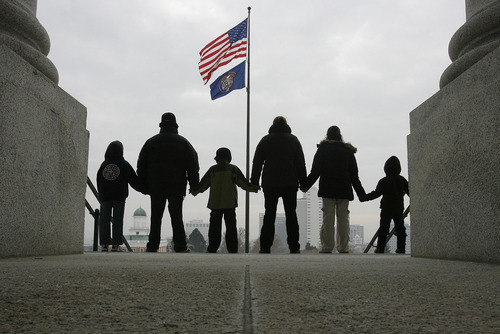This is an archived article that was published on sltrib.com in 2011, and information in the article may be outdated. It is provided only for personal research purposes and may not be reprinted.
The Immigration and Customs Enforcement officers who knocked on Michael Gordon's door at 6:30 a.m. wanted to know if he had seen the woman in a photograph they carried.
He replied no, but let them inside to ask his wife, Gloria. The couple quickly learned the photo was a ruse — it was Gloria they were after. The officers let her kiss her children goodbye, then took her away.
Gloria, 36, hasn't yet been deported, but the uncertainty that filled that March 2009 morning still permeates the family's daily life.
The couple had married four years earlier and built a home together. When they met at church in 2005, Gloria made sure Michael knew her story before things got serious. She was smuggled into the U.S. from Guatemala at age 19, along with her boyfriend and future father of her three children.
Gloria unsuccessfully sought political asylum based on her experiences as a victim of violence that she's reluctant to share. She received a Social Security number while her application was pending, one she uses for employment and to pay taxes.
It took her years to leave an abusive relationship with the father of her children.
"There was fear of not knowing where to go or who to turn to with no family here," she said.
Although her former partner threatened her life, Gloria also testified against him for a crime, which led to his deportation.
"I don't want to go back [to Guatemala] and find out whether those threats were real or not," Gloria said.
Michael patiently waited for her to accept his dinner invitation. She was hurt and distrusted men, he remembered.
But once love filled the voids, they sought out lawyers and church counselors for advice. The couple followed their suggestions: Don't do anything because it will raise red flags and reform is just around the corner.
Sitting in their Salt Lake City living room in December, the two pondered the what-ifs of their decisions.
"Movies make it look like marrying a citizen solves everything, but it doesn't," Michael said.
Marriage can work, but only for people who entered the country on a legal basis. Those who didn't face a lengthy and treacherous process that doesn't guarantee staying in the U.S.
Gloria would rather go to jail and pay fines than be sent back.
"What would I do there?" she asks.
After paying nearly $10,000 in legal fees and spending hundreds of hours filling out about 20 immigration forms since her 2009 arrest, Gloria has one last hope. She has applied for a U-Visa, a document issued for abuse victims, which could grant her temporary legal status.
Free of an ankle bracelet she wore for nine months, Gloria reports every Monday to an ICE tracking contractor and once a month to an agency office. Twice a month, a contracting agent stops by the house.
"I try to distance myself from it," Gloria said. "I know that he [Michael] is doing everything possible for an answer."
Gloria still works full time and attends her children's school events. She volunteers with the Cub Scouts. On Sundays, the family attends church at their neighborhood ward of The Church of Jesus Christ of Latter-day Saints.
But it's not unusual for the couple to find their 12-year-old crying at night fearing his mom may be gone when he wakes up. Rachel, 15, speaks to a therapist to try to ease the stress.
"Even the thought that she might get deported scares me and breaks me down," Rachel said. "I don't want her to leave."
Gloria's deportation would also leave the family without one-third of its income and the health insurance she receives through her work.
"It's so hard to deal with this," Michael says, arguing there is no reason to deport a law-abiding community member such as his wife. "I had no idea our system was so broken until it started to affect my own family."
It's unclear how many mixed immigration-status couples such as the Gordons are in the U.S. because few statistics are kept. Their stories may vary, but all share the fear of being separated from their spouse.
Luis and Kate Romero (not their real names) tend to keep to themselves after being told marriage would not keep them legally together, since Luis is undocumented. They decided to marry eight years ago as the parents of one child with another on the way.
"We didn't know it was impossible to fix his papers, but that wasn't the point," said Kate, a citizen. "We loved each other and wanted to be a family."
Luis, 38, cares for their three children at home and supports a daughter from a previous relationship while Kate works. He doesn't drive anymore, not wanting to take a chance at being detained.
The youngest of 11 children of a indigenous farming family in Mexico, Luis and two cousins left for the U.S. to look for work. He has worked as a dishwasher, fruit picker, construction worker, day laborer, caterer and woodworker.
The couple met while working at an alternative school for troubled Latino teens in Washington, then moved back to Kate's home state of Utah.
While Kate struggles daily with fears about her husband's legal status, Luis — like Gloria — said he has accepted the reality of his situation. He said he only worries about his children. More than once one of the kids has comforted the father by telling him they will always be together.
Kate and the children plan to follow Luis to Mexico if he is deported.
"I tell them not to be frightened," Luis said of his family. "I tell them we just have to be ready for what comes our way." Watch video



